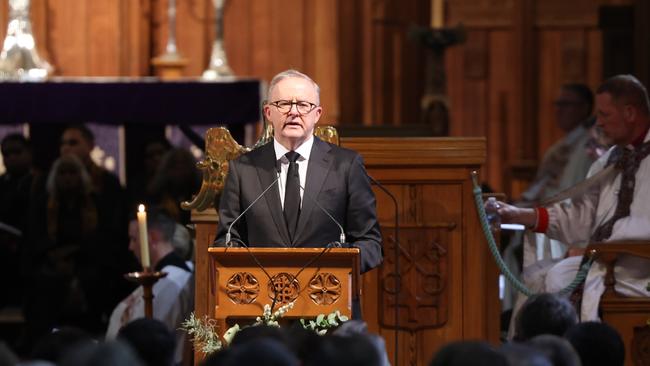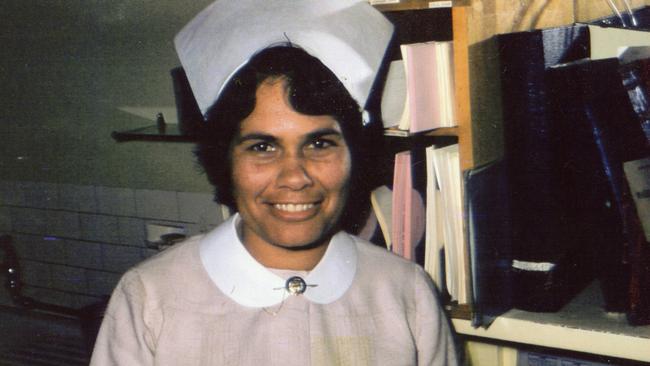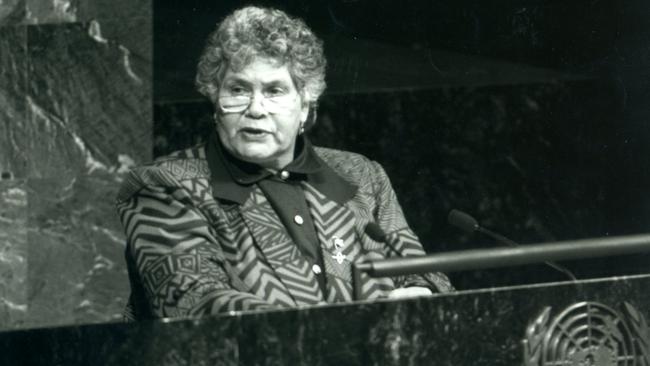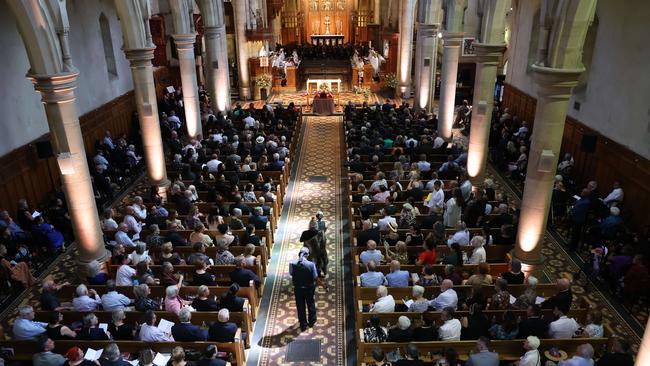Indigenous leader Lowitja O’Donoghue farewelled at St Peter’s Cathedral in Adelaide
One of Australia’s greatest leaders has been remembered as a “great rock” who never stopped campaigning for justice for Indigenous people.
A trailblazing Indigenous leader who suffered through the trauma of discrimination before rising up to help usher in native title laws in the 1990s has been remembered as a “great rock” in Australian history in an emotional farewell attended by Anthony Albanese and hundreds of mourners.
Dr Lowitja O’Donoghue AC CBE DSG was farewelled at St Peter’s Cathedral in Adelaide following her death in February, with the low, solemn notes of a didgeridoo sounding out at the beginning of the service.
Bishop Chris McLeod, dean of the cathedral, opened the service and prayed for a “more just settlement” for all First Nations people.
“We have come together to thank God for the life of Lowitja O’Donoghue,” he said.
“To celebrate a life well lived, to mourn and honour her.”
The Prime Minister praised Dr O’Donoghue for her “unceasing work” to better the lives of First Nations peoples.

“Her remarkable power was one built on an abiding faith in the possibility of a more united Australia,” he said.
“This was a faith she embodied with her efforts to bring about meaningful and lasting reconciliation between Indigenous and non-Indigenous Australia.
“A faith underpinned by her unceasing work to improve the lives of Aboriginal and Torres Strait Islander people.
“Yet consider the stony ground in which this faith somehow took root.
“Starting with a childhood that saw her separated from her family, her language and her own name, Dr O’Donoghue endured discrimination that would have given her every reason to lose faith in her country, but she never did.
“The little girl who longed to be reunited with her mother somehow transcended the weight of her own experience and grew into a woman of grace, moral clarity and profound inner strength.

“A woman who grew up in hard country, yet emerged as a figure of such generosity.”
Dr O’Donoghue was born in remote South Australia in 1932 and she was separated from her mother.
She became the first Aboriginal nurse trained at the Royal Adelaide Hospital.
The Yankunytjatjara woman served as the inaugural chair of the Aboriginal and Torres Strait Islander Commission and addressed the United Nations General Assembly in 1992.

In 1993, she led negotiations with Prime Minister Paul Keating on native title legislation following the High Court’s landmark Mabo decision.
High-profile Indigenous leaders, including Noel Pearson, Professor Megan Davis, Pat Anderson AO and Professor Marcia Langton, attended the service, alongside a sweep of distinguished guests, including Governor-General David Hurley and South Australian Premier Peter Malinauskas.
South Australian senator Kerrynne Liddle represented Opposition Leader Peter Dutton at the service.
Ms Anderson, an Alyawarre woman and Lowitja Foundation chairperson, said Dr O’Donoghue served as an inspiration to young Indigenous women.

“There is a whole generation of First Nations women who flourished because of Dr O’Donoghue,” she said, adding young Indigenous women were often “starstruck” by Dr O’Donoghue’s presence and were inspired to follow in her footsteps.
“She never stopped campaigning for justice, for us,” she said.
Foreign Minister Penny Wong, in a speech for an International Women’s Day breakfast in Adelaide on Friday, said she saw Dr O’Donoghue as a “role model”.
“Lowitja was an icon and role model for so many of us and especially for First Nations women around Australia, for what could be achieved and also the way to achieve it,” she said.
“But she could never regain a childhood with the singular and profound love of her own mother.
“Many of you are here with your mother or daughter.
Ms Anderson also said Dr O’Donoghue’s Christian faith had given her “joy” and “sustained her through some hard and dark times”.
“She loved the symbolism and richness of the church,” she said.
Adelaide-born singer Paul Kelly sang Bob Randall’s “Brown-Skinned Baby”, one of Dr Donoghue’s favourite songs.
Mr Malinauskas and SA Attorney-General Kyam Maher read passages from the Bible, and Dr O’Donoghue’s niece spoke lovingly of her “aunty”.
“I do love you, Aunty, we all do, so very much,” she said, her voice breaking.
The mourners sang “We Shall Overcome” as pallbearers carried Dr O’Donoghue’s coffin out.



